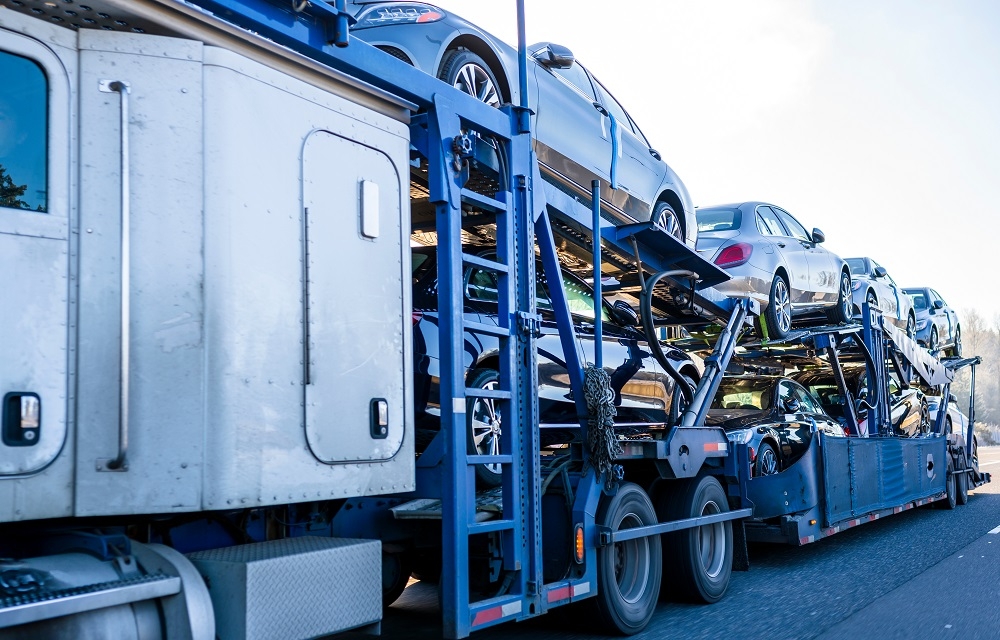The car buying process has changed dramatically in the past few years. You can shop online from the comfort of your home to browse thousands of vehicles in dealerships across the country. And if you find one you like, you can get it shipped to you.
Shipping a car from a dealership to another state is easier than it may seem. Some dealerships have car hauler contracts that facilitate the shipment of vehicles to customers in other states, though it can vary from state to state.
However, dealerships may have their own policies for shipping out of state because of legal, logistical, or cost reasons, including sales tax differences between states.
Interested in purchasing a car from out of state and wondering about dealership shipping options? This is your guide to shipping policies, logistics, costs, legal concerns, and tips to prepare for the process.
Understanding Car Dealership Shipping Policies
Dealerships can ship cars to other states, but the process for doing so can vary widely from dealership to dealership. Some dealerships may offer free or discounted shipping as a promotional incentive, others may charge a fee, and some may have specific restrictions on where they’ll ship vehicles.
Since shipping vehicles across state lines comes with additional legal, logistical, and cost considerations, it’s not a guarantee every dealership will do it. They have to handle the legal aspects of the sale and transport, coordinate shipping with an auto transport company, and choose a suitable delivery location.
If you’re shopping for a vehicle at a dealership in another state and hoping to get it shipped, it’s best to speak with the dealership directly about their policies. If they don’t offer shipping or the terms aren’t agreeable, you can be prepared to seek out other options for shipping.
Costs Associated with Shipping a Car Across State Lines
Shipping a car across state lines has additional costs that you may not be expecting, including:
Transportation fees: The highest cost is the transportation fee, which can vary based on the distance your car travels, the type of car, and the auto transport company’s rates.
Taxes: The cost of sales tax in different states can vary widely, but you’ll need to pay the taxes according to your home state. If your dealership handles shipping and out-of-state purchases, they should help you coordinate your taxes.
Additional services: You may have to pay additional fees for expedited shipping, additional insurance, or door-to-door delivery. Make sure you’re prepared for the total cost upfront.
How to Get a Good Deal
Shipping your car with a reputable transporter isn’t cheap, but it’s a worthy investment to keep your vehicle safe. You can, however, get a good deal if you’re prepared for the process. Here are some tips:
Don’t be afraid to negotiate: If you’re buying a car from a dealership, include the shipping costs in your negotiation. Your dealership may be willing to assist with some of the shipping costs to close the deal.
Get quotes: Get multiple quotes from auto transport companies to compare prices and services. You can use our car shipping cost calculator for this.
Be flexible: The costs for shipping are higher during peak seasons and if you have inflexible pickup and delivery dates. If you’re more flexible, you could get a better rate on your shipping.
Look for discounts: Some dealerships offer discounts for certain groups like military veterans, seniors, or students. Check if you’re eligible for any discounts.
Legal and Regulatory Considerations
Buying a car in a different state and having it shipped to you involves a few more legal and regulatory steps than buying a car near your home. Here are some things to consider:
Registration: You will need to register your car in your state of residence, which includes submitting the title, proof of insurance, and any other forms required by your state’s Department of Motor Vehicles (DMV). Some states may require an inspection.
Title transfer: The dealership or seller should provide you with a signed title to transfer the car to your name. This process varies by state but typically includes submitting the signed title to the DMV with any required fees and forms.
Insurance: You will need insurance coverage for the car before you register it. Some insurance companies offer temporary coverage for newly purchased vehicles pending a permanent policy.
Emissions standards: Some states have strict emissions standards, so it’s important to ensure that the car you’re buying meets the emissions requirements of your home state. You may need to get emissions testing before you can register your car.
Sales tax: As mentioned, you may need to pay sales tax on the car based on the state where you registered it, not where you bought it. Some states will allow credits for sales tax that you paid in another state, so check the regulations in both your home state and the purchasing state. The dealership should be able to assist with this step.
Here are some tips to ensure your car purchase runs smoothly:
Research state regulations to familiarize yourself with the requirements of both the state you’re purchasing the car in and the state where you plan to register it.
Start the registration process as soon as possible to avoid delays. You should have all the necessary documents and information and prepare for any fees you will need to pay.
If you’re unsure about any aspect of the process, consult with a professional who can provide guidance. Dealerships can often guide you through the process.
Don’t skip over the legal and regulatory considerations for buying and shipping a car from another state. Doing your homework ensures a smooth and compliant process.
Preparing for Your Vehicle’s Arrival
Though the process of purchasing and shipping your car can be complex, the work isn’t over until you complete the delivery process. Here’s how you can prepare:
Verify insurance: Make sure your insurance coverage is in place before your car arrives. Contact your auto insurance provider to update your policy.
Conduct a thorough inspection: Before the car is loaded onto the transport vehicle, conduct an inspection and document the interior and exterior thoroughly, making note of any damage. This is important for your records if any damage occurs in transit.
Communicate with the auto transporter: Stay in touch with the car shipper or dealership to confirm the delivery timeline and any instructions for receiving your vehicle, especially if you’re getting it delivered directly to your home. Provide clear contact information and make sure you’re available to answer and coordinate the delivery.
Prepare to receive your vehicle: When the car arrives, be prepared to inspect it again and identify any new damage. Take plenty of interior and exterior photos and videos as evidence of its condition. Check the delivery receipt for any issues before signing.
Finalize any outstanding payments: If you have payments or fees outstanding, make sure to settle them before you take possession of the car.
Register and transfer your car: Once you have the car, complete the registration and title transfer process with your state’s DMV.
Expand Your Car Buying Options with Out-of-State Shipping
Online buying and dealer shipping can give you more options to buy the exact car you want and have it shipped. This process is a little more complex than buying a car the next town over, but you can access more inventory and potentially get a better deal.
If you have a new vehicle to ship from a dealership in another state, Nexus Auto Transport can help. Contact us for more information on out-of-state auto shipping and get a quote!
FAQs
Can a Dealership Ship a Car to Another Dealership?
Yes, dealerships may ship a car to another dealership using auto transport companies. However, not all dealerships are willing to ship to another dealership in a different state, so be sure to check with them in advance.
Do Dealerships Always Ship Cars?
With the rise of online car buying, more and more dealerships are offering shipping options if you purchase a vehicle. If your dealership doesn’t, you can arrange your own car shipping with an auto shipping broker to have the car delivered to you.
What Is a Dealer Trade?
Not all dealerships have the exact vehicles you want in stock, but a partner dealership may. So, some dealerships offer dealer trades, which are a deal to exchange or swap similar vehicles among dealerships and have them transported.
Is Car Shipping Door to Door?
Some dealerships or auto shipping services will deliver to your door, but not always. If the address isn’t accessible for the trailer, you may need to make arrangements to pick up your vehicle at a nearby location. Door-to-door shipping may have higher costs as well.
Can I Ship an Oversized Vehicle from a Dealership?
Oversized vehicles, such as an RV, can be shipped from a dealership out of state, depending on the dealership’s individual policies. It’s crucial to communicate with the dealership or carrier in advance, however. These vehicles are often shipped on flatbeds instead of carriers, so the shipper will need to make special arrangements.



